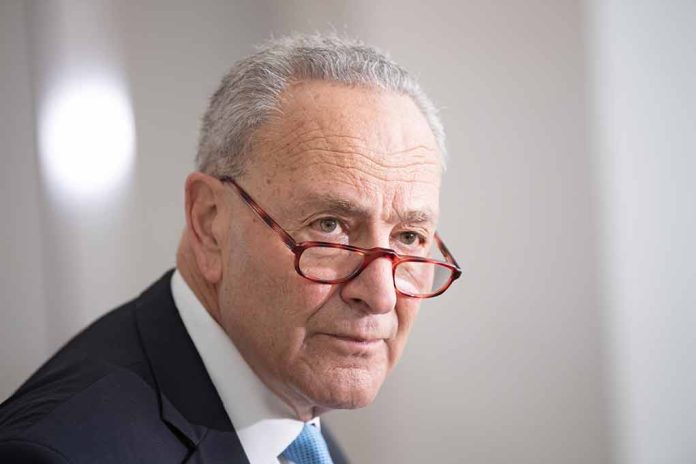
Senate Majority Leader Chuck Schumer rejects House GOP budget plan, intensifying the risk of a government shutdown as the deadline approaches.
At a Glance
- House Republicans propose a plan to fund the government until March 2025
- The plan includes stricter voter ID requirements, which Democrats oppose
- Schumer dismisses the proposal, calling for bipartisan cooperation
- Government shutdown looms if an agreement isn’t reached by the deadline
House GOP Unveils Controversial Budget Plan
As the threat of a government shutdown looms, House Republicans have put forward a plan to fund the government into March 2025. The proposal, which includes stricter proof-of-citizenship requirements for voting, has drawn sharp criticism from Senate Democrats and the Biden administration. Speaker Mike Johnson emphasized the plan’s dual focus on government funding and election security.
The Republican plan pairs a continuing resolution (CR) with the Safeguard American Voter Eligibility (SAVE) Act, mandating states to obtain proof of citizenship for voter registration and purge noncitizens from voter rolls. This provision has become a significant point of contention, with Democrats arguing it could disenfranchise eligible voters.
Schumer Rejects GOP Proposal To Link Bill Requiring Voters Prove Citizenship With Spending Measure https://t.co/nkuZy89UWk
— Daily Wire (@realDailyWire) September 9, 2024
Schumer’s Firm Rejection
Senate Majority Leader Chuck Schumer has decisively rejected the House Republicans’ budget proposal, calling for a bipartisan approach to avoid a government shutdown. Schumer’s stance underscores the deep partisan divide in Congress and signals potential difficulties in reaching an agreement before the looming deadline.
Schumer’s goal is to pass a continuing resolution without what he calls “poison pills or Republican extremism” to prevent a “pointless and painful government shutdown.” His emphasis on bipartisan cooperation reflects the historical precedent of passing funding bills through collaborative efforts.
Implications of a Potential Shutdown
The ongoing budget dispute raises concerns about the potential impact on federal workers and services if a shutdown occurs. A government shutdown could result in furloughs for federal employees, disruptions to various government services, and economic repercussions. The situation is reminiscent of previous shutdowns, which have caused significant disruptions to public services and the economy.
“Let us hope the majority does not drive us straight to a Republican shutdown,” – Rep. Rosa DeLauro (Conn.)
Critics, including some Republicans, doubt the effectiveness of the House GOP’s strategy and expect Senate rejection. The White House’s Office of Management and Budget (OMB) has also criticized the six-month CR approach, highlighting the need for a more comprehensive, long-term solution.
Next Steps and Potential Outcomes
As the deadline approaches, the focus shifts to potential compromise solutions. If a bipartisan agreement isn’t reached, Congress may need to consider short-term funding measures to avoid a shutdown. The situation remains fluid, with both parties under pressure to find common ground while adhering to their respective priorities.
The coming days will be crucial in determining whether Congress can bridge the partisan divide and avert a government shutdown. As negotiations continue, the American public watches closely, hoping for a resolution that ensures the continuity of government operations and services.
Sources:
- House GOP unveils stopgap plan to avert government shutdown
- Chuck Schumer rejected the House’s government funding plan, saying it does nothing to avert a shutdown on Oct. 1.
- Schumer snubs House Republicans in looming shutdown fight
- Shutdown looks more likely, as House GOP leaders reject Senate plan
- Schumer urges House Republicans to drop demands on government funding
- Senate rejects legislation that would expand child tax credit and restore business tax breaks



